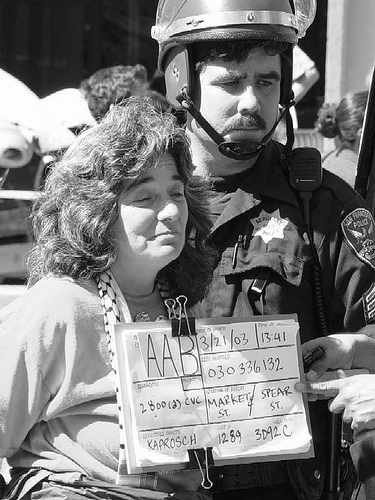Seventh Sunday after Pentecost Lectionary Reflection
July 15, 2012
And he solemnly swore to her, “Whatever you ask me, I will give you, even half of my kingdom.” She went out and said to her mother, “What should I ask for?” She replied, “The head of John the baptizer. ” — Mark 6:23-24
Everything has a cost associated with it, including each and every choice we make. Some of our choices are “no brainers” and have seemingly no cost or ill consequence attached. Many of the choices we make, however, come at significant cost to ourselves and others. Responses to this reality tend to fall and fluctuate between two extremes–plunging forward without regard for any collateral damage or stymied into inaction by fear of the “what-ifs.”
This week’s gospel lesson from Mark is a classic study in the costs that result from the decisions of John the Baptist and Herod Agrippa. The placement of this story snippet seems a bit odd at first glance, as it comes sandwiched in the narrative between two ministry stories–Jesus commissioning and sending the disciples out and the feeding of the 5,000+. Given a closer look, however, one can see the deliberate stroke Mark might be making with this placement.
Jesus, who has achieved more than a little notoriety and success with his teachings and miracles is soundly rebuffed in his own home village. His response is to widen the ministry by sending the disciples out as pilgrim wayfarers (sandals and staff, one tunic), first century wandering minimalists focused solely on their mission. Vocational church workers and would-be seminarians might do well to note this fact! Traveling light is a good thing when one is proclaiming the good news.
 Immediately following the “prophet on a platter” segment is the brief mention that Jesus and the disciples are trying to get away for some much needed rest and relaxation. It doesn’t work in this particular case, but the reminder is there for those who work in the church that even Jesus would encourage taking one’s holiday and paid leave because the work is tough. Just ask John the Baptist, the prophet whose absolute dedication to truth-telling cost him his life.
Immediately following the “prophet on a platter” segment is the brief mention that Jesus and the disciples are trying to get away for some much needed rest and relaxation. It doesn’t work in this particular case, but the reminder is there for those who work in the church that even Jesus would encourage taking one’s holiday and paid leave because the work is tough. Just ask John the Baptist, the prophet whose absolute dedication to truth-telling cost him his life.
Most of us will never face losing our life for the gospel, but it’s certainly not impossible that such a thing might come to pass. There are plenty of examples of those who have made such sacrifice in the name and service of Christ throughout time and who continue to face persecution and death today. The question that begs asking is at what cost will one stand as truth-teller, prophet, and/or sharer of the good news? Is there hesitation? I would be untruthful if I said I have never counted the cost of my vocation. Would I speak out publicly for injustice on behalf of the poor, marginalized, or vulnerable if it meant I might lose my job and livelihood? Would I protest like the Berrigan brothers in clear violation of the laws of the land? Would I speak the truth and risk alienation from friends, family, the congregation I serve, or my denomination?
John the Baptist spoke the truth about Herod Agrippa’s second marriage in a way that politically charged and highly risky. See Ched Myers’ Binding the Strong Man: A Political Reading of Mark’s Story of Jesus for a fine treatment of this passage (pp. 214-17). Mark’s audience would certainly have understood the implications of this story in light what it meant to challenge the establishment as followers of Jesus and truth-tellers in the face of injustice and Empire.
 A modern parallel is found in what some scientists are currently facing when they speak about climate change. Texas Tech professor and evangelical Christian Katharine Hayhoe received hate mail and media derision for speaking out. Nobel Peace Prize winning Penn State paleoclimatologist Michael Mann has faced numerous threats, lawsuits, and attempts to discredit his work.
A modern parallel is found in what some scientists are currently facing when they speak about climate change. Texas Tech professor and evangelical Christian Katharine Hayhoe received hate mail and media derision for speaking out. Nobel Peace Prize winning Penn State paleoclimatologist Michael Mann has faced numerous threats, lawsuits, and attempts to discredit his work.
Conversely, as we see with Herod, potential high costs are part of the territory when it comes to ill-conceived choices and actions. Mark tells us Herod “…feared John, knowing that he was a righteous and holy man, and he protected him.” It took only one drunken promise and the prevailing culture of honor and shame to render these feelings useless when said promise came back to bite him. I suppose he feared Herodias and potential disgrace more than a truth-telling prophet of God.
So what about us today? How do we count the cost of being a disciple of Jesus? To what lengths are we really willing to go to share the good news, speak against injustice, and bring about the reign of God? What are our fears and stumbling blocks? Importantly, how can we as the body of Christ–the Church–stand together and support one another in faithful living in the world?
At what cost do you ask these questions? At what cost do you not ask them? Blessings on your preaching, teaching, and daily discipleship walk.
Photos by Franco Folini, Randy OHC, and takver used under Creative Commons License. Thanks!
With Adults/In Worship
Consider showing a video clip about one or more martyrs, particularly in an adult class or forum. Bishop Oscar Romero might be a good choice. Click here for a long but effective YouTube clip (almost 10 minutes) blending scenes from the 1989 movie starring Raul Julia. Warning: This clip is graphic and contains disturbing images. Click here for an informative video about Daniel and Philip Berrigan, Roman Catholic priests, who took strong and costly stands for their beliefs.
If your context is receptive to blending contemporary rock into worship, consider using Linkin Park’s video for “What I’ve Done” as a meditative confession followed by a spoken absolution. Click here to watch the video.
With Youth
Get a copy of Jesus Freaks by dc Talk and Voice of the Martyrs. This devotional book geared for youth offers 150 stories and quotes about those who took a stand for the gospel at great personal cost. Check out this YouTube video of the song “Jesus Freak” by dc Talk. It would make a good visual accompaniment to use with this week’s gospel reading. Ask youth how difficult it would be for them to take a stand as a Christian and disciple of Christ? Have they ever experienced difficulty or been ridiculed for their faith? Another YouTube video worth considering is Nickelback”s “If Everyone Cared.” Click here to access it.
With Children
Take this opportunity to talk with children about the lesson from Amos by bringing a plumb line to demonstrate how one is used. Check this ehow article for more information. You can even have the children make their own “plumb lines” with a washer and colorful yarn. Consider providing a small box or bag in which to store the plumb line. What does it mean to be upright, steadfast, righteous, and truthful? How can an ordinary person, even a child, be a “plumb line” as a disciple?




Hi, Sharron,
Excellent socio-political analysis of the text and the prevailing questions for Christian communities as they consider how faith impacts society and culure.
Thank you, Gary! As former ELCA Presiding Bishop H. George Anderson wrote in 1997, “A good time to be the church is right now.” It’s always a good time to be Christ’s church, and that also involves engaging the world and asking some tough questions. Thankfully, God will not forsake us–no matter how badly we bumble and stumble. Blessings on your ministry! Say hi to the folks at Trinity for me.